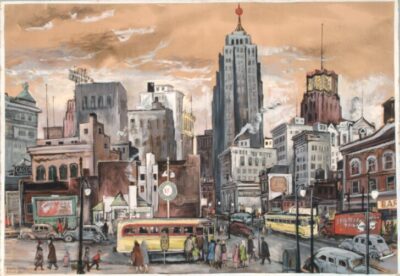Greetings, USIH friends, old and new! We welcome your proposals for our 2025 conference, to be held November 6-8, 2025, in historic Detroit, Michigan. Submissions are due on 1 May 2025, and you can find the Call for Papers here.
Our theme is “Creativity & Renewal,” and we interpret that broadly. Your proposals may focus on science, culture, politics, race, religion, gender, government, society, education—covering ALL time periods and events in U.S. history. We are glad to consider submissions that address any aspect, period, or problem from the history of American thought. Our meeting is meant to be a rich and diverse forum for those working in the realm of intellectual history.
Please use the comments, below, to connect with colleagues and construct panels. See you in Detroit!


8 Thoughts on this Post
S-USIH Comment Policy
We ask that those who participate in the discussions generated in the Comments section do so with the same decorum as they would in any other academic setting or context. Since the USIH bloggers write under our real names, we would prefer that our commenters also identify themselves by their real name. As our primary goal is to stimulate and engage in fruitful and productive discussion, ad hominem attacks (personal or professional), unnecessary insults, and/or mean-spiritedness have no place in the USIH Blog’s Comments section. Therefore, we reserve the right to remove any comments that contain any of the above and/or are not intended to further the discussion of the topic of the post. We welcome suggestions for corrections to any of our posts. As the official blog of the Society of US Intellectual History, we hope to foster a diverse community of scholars and readers who engage with one another in discussions of US intellectual history, broadly understood.
Hello fellow intellectual historians,
I am trying to put together a USIH panel on games—tabletop games or video games or, really, any game—for this year’s conference. My paper would draw from my current project: an intellectual and cultural history of Dungeons and Dragons. Please contact me here https://gregoryjoneskatz.com/contact/ if you’re interested!
Hello,
My name is Clayton Cummings. I am a PhD student in the History of Ideas at the University of Texas at Dallas. I am interested in creating a panel based on religious history and historical memory. If anyone would be interested in forming a panel or would be curious about reforming the topic of the panel, please contact me at ClaytonCummings@utdallas.edu
Hello fellow intellectual historians! I am looking for fellow panelists for a potential panel on games–tabletop, video, really, any type of game. My paper would draw from my new project on the intellectual and cultural history of Dungeons and Dragons. If you’re interested, then please contact me here: https://gregoryjoneskatz.com/contact/
Thanks! – Greg
Hello. I’m looking to build a panel for S-USIH 2025 around the intellectual legacy of Black American anti-imperialism and its relevance to our current moment. I’m especially interested in revisiting figures like Paul Robeson, organizations like the Council on African Affairs, and the broader anti-colonial front of the 1940s. Robeson, for instance, famously insisted that U.S. foreign and domestic policy could not be separated—a stance the Truman administration rejected, and one we might argue still goes unheeded today.
This panel would explore how the frameworks and ideas of Black anti-imperialists of the 1940s might offer renewed insight into today’s global crises—from Ukraine and Palestine to domestic issues like policing, surveillance, and the erosion of democratic rights. I’m looking for fellow scholars interested in topics such as:
The intellectual and political thought of Robeson, Du Bois, Claudia Jones, or others in the Black radical tradition
The history of organizations like the Council on African Affairs as sites of transnational political and intellectual engagement
The merging (or separation) of U.S. domestic and foreign policy across time
Applications of mid-20th century Black internationalism to current questions of U.S. empire and global resistance
Connections between past and present efforts at Black and global solidarity
If you’re working on any related themes—historically grounded or theoretically expansive—I’d love to connect and form a panel together. Let’s bring this conversation to Detroit!
Feel free to reply here or reach out directly.
In regards to the above, I can be reached at amandaputnam95@gmail.com. Please contact me if you are interested in collaborating on any of the above topics.
We are putting together a panel exploring new ways to foster undergraduate research and transform it into public-facing scholarship. Stephen Kercher, Professor of History at the University of Wisconsin at Oshkosh, has spent much of his career focusing on this question with remarkable success. If you are doing similar work, please consider joining a panel with him this fall. Contact murphyp@gvsu.edu.
I have a Detroit-based topic I’d like to talk about at the conference, radio preacher Fr. Charles Coughlin. He comes up in my research on Religious News Service. Anyone who would be interested in putting together a panel on Coughlin, or including him, please reach out to me at elesha_coffman@baylor.edu!
Possible topics include:
Catholicism in the 1930s
religious media
hate speech
lovers and haters of the New Deal
Detroit-based newsmakers
Hello everyone, I have a paper on Jack Kemp’s time as Secretary of Housing and Urban Development and reactions to his policy proposals from both the religious right and religious left. If anyone would be interested in putting together a panel on urban renewal, the politics of the early ’90s, or anything related to Kemp or anything along those lines, please let me know. My e-mail is david_nanninga1@baylor.edu. Thank you!